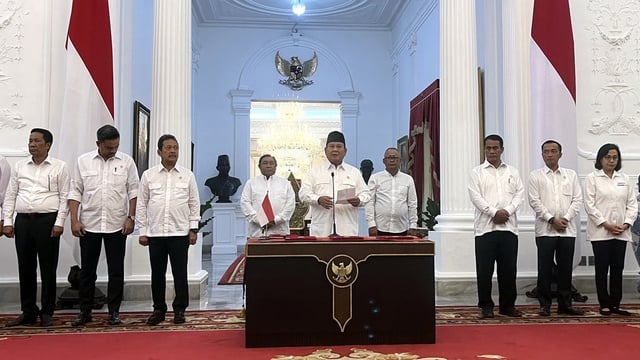Presidential Decree on MSME Debt Amnesty Realizes the Concept of People’s Economy in the Era of President Prabowo
By: Rivka Mayangsari*)
Indonesia is currently at an important moment in its efforts to improve the economic welfare of the people, especially in the micro, small and medium enterprises (MSMEs) sector which is the backbone of the national economy. President Prabowo Subianto has shown his commitment to strengthening this sector through the planned issuance of a Presidential Regulation (Perpres) on MSME debt relief. Chairman of the Advisory Board of the Indonesian Chamber of Commerce and Industry (Kadin), Hashim Djojohadikusumo, stated that this step will have a major impact on the financial stability of business actors.
This step is taken to improve the distribution of bank credit to MSMEs and, most importantly, to eliminate the right to collect by banks from borrowers whose debts have been written off. With this Presidential Regulation, it is hoped that MSMEs who have been entangled in debt can restart their businesses without the burden of debt that has hampered their growth and innovation.
Hashim Djojohadikusumo emphasized that Prabowo Subianto is serious about realizing a people’s economy through various pro-people policies. This debt amnesty is a real example of the government’s commitment to providing concrete support to MSMEs. So far, financial constraints, especially unresolved debt burdens, have been the main obstacle for many MSMEs to develop.
Senior Economist and Associate Faculty of the Indonesian Banking Development Institute (LPPI), Ryan Kiryanto, also welcomed the debt amnesty plan. According to him, this policy not only provides an opportunity for business actors to rebuild their businesses, but will also create a multiplier effect on domestic economic activities. Ryan Kiryanto explained that if this program is implemented immediately, the banking sector can also actively expand, especially for those who already have a long-standing consumer base.
This policy is considered to have a positive impact that will have a chain effect on the economy. With the elimination of debt that has been written off, business actors such as farmers, fishermen, and other MSMEs will have financial flexibility to develop their businesses or improve their operational conditions. This, in the end, will increase their income and the purchasing power of the community as a whole, which then contributes to national economic growth.
In addition, with a more flexible banking sector, it is expected that banks will be more active in channeling new credit for MSMEs that require additional business capital. This step will strengthen the foundation of the Indonesian economy which is based on micro and small business actors that are oriented towards the domestic market. As a result, MSMEs that have been constrained by debt will be able to operate again and create new jobs for the surrounding community.
On the other hand, banking also expressed its support for this policy. BRI Micro Business Director, Supari, stated that currently BRI is in a waiting position until the Presidential Regulation is issued. Supari also said that the synergy between the government and the financial sector, including BRI, will continue to encourage the progress of Indonesian MSMEs and realize an inclusive and equitable people’s economy.
With the support of national banks such as BRI, MSMEs are expected to gain wider access to banking services, from financing to other supporting services. This step is also expected to strengthen the financial structure of MSMEs, so that they not only grow, but also survive in the long term.
This debt amnesty is a concrete proof of the concept of people’s economy which is one of the main pillars of President Prabowo’s administration. Through this policy, President Prabowo Subianto seeks to encourage the revival of the MSME sector and improve the welfare of the common people. This is very relevant to the current economic situation in Indonesia, where MSMEs need maximum support to be able to recover from the impact of the pandemic and various other economic challenges.
The concept of people’s economy itself is based on the principle that economic development must involve all levels of society, not just certain groups. By providing financial relief to MSMEs, the government hopes to revive the spirit of mutual cooperation in the economic sector and create equitable prosperity.
As a follow-up step, the government will ensure that the implementation of this Presidential Regulation runs smoothly and effectively. This will not only benefit MSMEs, but also create stability in the banking sector which has so far played a role as a credit provider. Through this Presidential Regulation on MSME debt amnesty, the government is expected to be able to realize an inclusive, equitable economy that supports the interests of the common people.
With this debt amnesty, President Prabowo has demonstrated his commitment to supporting small businesses that play an important role in maintaining domestic economic stability. For Prabowo, the people’s economy is the foundation for achieving a more prosperous and sovereign Indonesia, where every citizen has an equal opportunity to advance and develop.
This step of debt amnesty for MSMEs is expected to be a stepping stone for small business actors to continue to grow and make real contributions to the national economy. This support is not just financial assistance, but also a form of government trust in its people to work together to build a stronger and more sovereign Indonesia.
